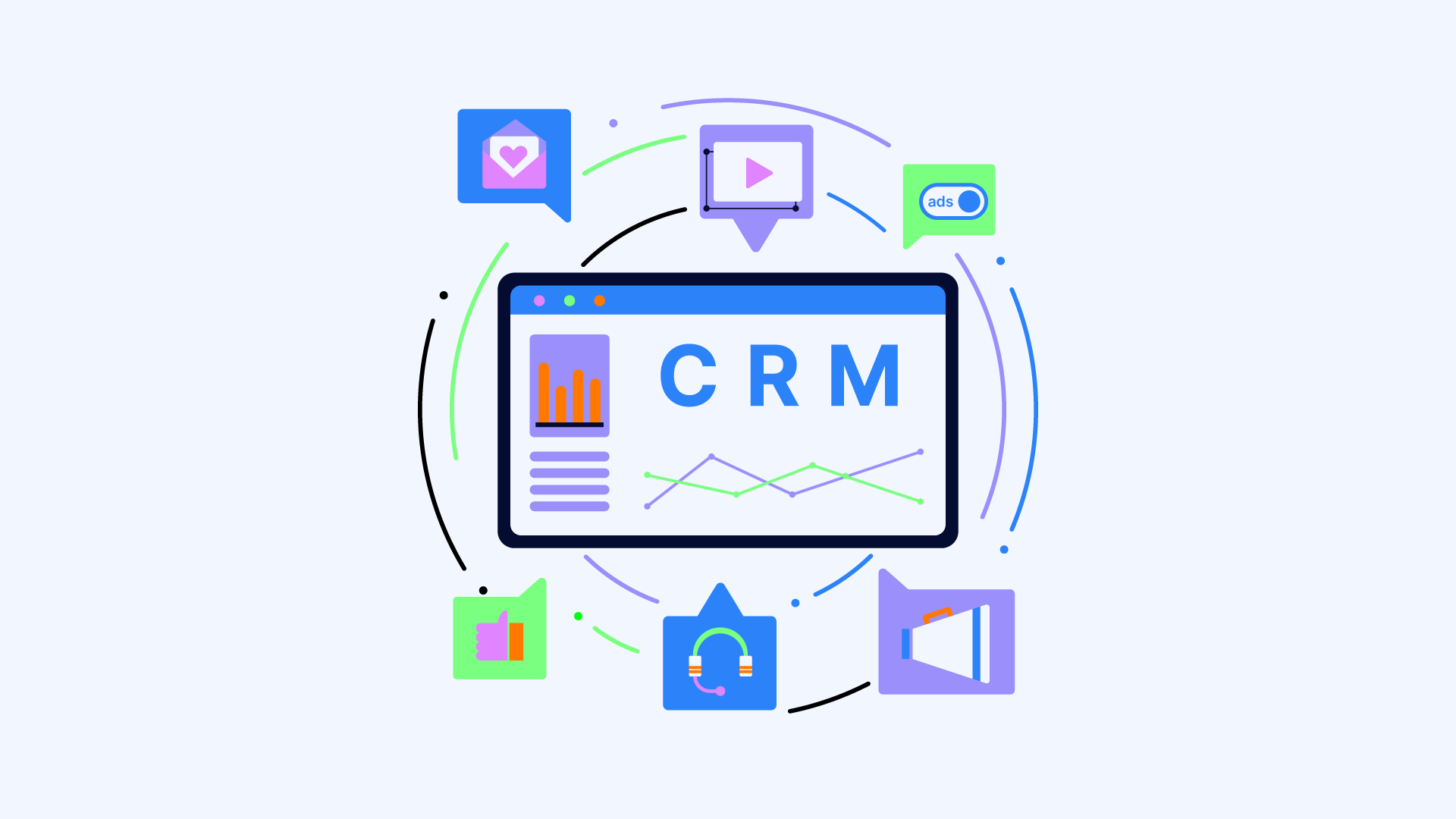If you’re looking for CRM statistics, this post is for you. Customers are at the heart of every business. The way you interact with your customers defines how successful your business will grow.
Though there are a number of ways a CRM Can Benefit your Business, Customer relationship management software helps businesses to reach greater heights by interacting consistently with their customers in the right way.
There is no doubt that the CRM market will continue to grow as more and more companies adopt a CRM platform to streamline processes, increase sales, and become more transparent than ever before. We will see some exciting changes and new CRM trends in the future.
In this article, we will look at the most recent CRM statistics, research, facts, and trends in the industry.
General CRM Statistics
1. The demand for digital channels is rising.
The CRM market is set to gain significant growth by 2028 due to the rising demand for digital channels of communication by consumers.
Grandview Research shows that about 67% of customers now interact with brands on social media, this is an indicator of CRM demand by customers.
2. Companies typically invest in CRM technology within the first 5 years.
The customer experience is a key part of a company and most of them usually invest in a CRM within the first 5 years of operation.
Generally, CRM tools are used by about 80% of sales teams, 46% by marketing, and 45% by customer services.
CRM usage is crucial for automating tasks, managing contacts, and improving customer service, which ultimately enhances productivity and customer relationships.
3. 57% of executives reported struggling to maintain good customer experiences.
Forrester and Salesforce report having found how essential CRM systems are for supporting business resiliency.
A survey revealed that around 57% of executives struggled to maintain good customer experiences since the shift to remote work because their CRM was not easily accessible.
4. 65% of sales professionals now use a CRM regularly.
According to linked research, about 65% of sales professionals use a CRM regularly, and around 97% consider CRM usage to be either important or “very important” for increasing sales and improving customer service.
5. Millennials use CRM Technology more than Gen X and baby boomers.
Millennials are using and adopting CRM technology, about 28% of them say the technology is critical to their success, but only 18% of Generation X and 9% of baby boomers see it as critical.
6. 75% of customers say they’ll spend more on products from a company offering a good.
There is a strong relationship between the demand for good customer experience and the need for CRM technology.
According to Zendesk, 75% of customers say they’ll spend more on products from a company offering a good customer experience (CX).
Being able to track and manage conversations across multiple channels will become a basic standard part of offering good CX, as more people are exposed to digital communication.
It is also important to consider how digital communication is growing for consumers. In 2020, about 64% of customers started using a new channel for customer service.
7. Companies consider CRM technology to be a critical part of their business success.
Companies widely consider CRM technology to be a critical consideration for business success.
Around 81% of executives see CRM technology will developing beyond the use of tools for sales and service support in the next 3 to 5 years.
CRM Adoption Statistics
8. 91% of companies with 10 or more employees use a CRM.
CRM technology is fast becoming a staple feature in all business technology.
According to Grandview Research, more than 91% of companies with 10 or more employees use a CRM to manage customer conversations.
The use of CRM analytics features also represents one of the fastest-growing areas of CX technology.
9. Sales teams spend around 18% of their time in a CRM system.
Although you expect that sales teams will be the ones to use CRM technology the most, they only spend about 18% of their time viewing CRM insights.
Additionally, sales teams are found to spend around 35.2% of their time on things unrelated to sales and customer service.
10. About 22% of salespeople don’t know what a CRM is.
With the opportunities that CRM technology brings to a business, only 22% of salespeople say they don’t know what a CRM is.
Furthermore, 40% of companies don’t use a CRM at all. These companies often rely on spreadsheets and email to store and track customer data.
11. 75% of decision-makers say they’re now embracing more tech.
Many companies have embraced digital tools in the wake of the Covis-19 pandemic, for the management of customer conversations.
Around 75% of decision-makers said the pandemic compelled them to increase their investment in digital software.
12. Companies are Prioritizing CRM Software Activities.
The HubSpot State of Marketing report shows that 75% of companies have prioritized closing more deals for their sales teams, and 48% want to improve the efficiency of sales funnels.
They also found that about 69% say they want to turn more contacts into customers, and 33% say increasing revenue from existing customers is a priority. To make these moves, companies will have to turn to CRM software.
CRM Software Statistics
13. 92% of companies already use databases to store customer information.
Companies show that they see the value in collecting data about their customer and they are doing so at an incredible scale.
About 92% of teams say they use a database to store customer data. Though they collect information, a lot of companies still don’t have a reliable way to manage it.
14. Around 82% of organizations use CRM for sales reporting.
About 82% of the companies surveyed by Grandview Research say they use their CRM systems for sales reporting and process automation.
Also, it is worth mentioning that senior management across companies is relying more on CRM solutions to handle actionable customer data.
15. 74% of companies say CRM technology gives better access to customer data.
Having a clear view of customer insights is key to delivering more personalized content and meaningful experiences. About 72% of companies say that using a CRM gives them access to customer data.
CRM Technology & Processes
16. CRM technology can improve business agility.
Given that Zendesk’s findings show that about 64% of their customers started using a new channel for customer service in 2020, CRM technology helped them adapt to changes in the market.
They were able to deliver adjust their operation to cater to the increasing demand for consistent experiences across every platform.
During the pandemic in 2020, about 80% of companies reported having to make changes to their support technology.
17. Productivity is a major benefit of CRM technology.
CRM usage can significantly improve productivity by reducing the complexity of the sales cycle by 8-14% on average.
CRM decision-makers also claim that using social and mobile CRM increases their productivity by 14.6%.
18. 72% of executives stated that improving customer-facing team skills is crucial.
Going forward, 72% of executives say that improving the data skills of their customer-facing employees and helping them access a single source of truth is crucial.
Although 90% of executives believe that having access to a single source of truth with their CRM is important, only 32% of companies say their current technology offers this today.
19. Many users want more advanced functions in CRMs.
Many users want more advanced functions like sales automation, customization tools, and even access to extensive reporting and analytics.
It seems, however, that the most requested features in CRM technology are things like schedule reminders (85%), interaction tracking (88%), and contact management (94%).
20. The global market for AI-enabled CRMs will reach $72.9 billion by only 2023.
Companies are always looking for new ways to learn about their target audience, and adopting a CRM platform with AI capabilities is emerging as an increasingly exciting opportunity. Research shows that the AI-enabled CRM technology global market will reach $72.9 billion by only 2023.
21. By 2023, 79% of companies are likely to be using AI-powered automation.
Salesforce Research is forecasting a rising need for AI. They believe that by 2023, about 79% of companies are likely to be using AI-powered automation to improve target audience engagement. They also see about 78% will likely be using AI automation to help support employees.
22. Around 61% of consumers now say they prefer online stores which offer AR experiences.
The way people shop and the ideas being proposed to improve customer experiences are amazing. These new forms of CRM technology may become more essential in the years.
For example, about 61% of consumers now say they prefer online stores which offer augmented reality experiences. Virtual and Augmented reality may become additional channels to track in the CRM, as well as video, voice, and chat.
CRM Technology and Customer Experience Statistics
23. 58% of consumers agree that technology has drastically changed their expectations.
Digital consumers have high expectations for their customer experience. About 58% of consumers agree that technology has drastically changed their expectations of how companies should interact with them.
Younger generations of consumers are becoming more dependent on mobile computing. For example, Millennials are nearly 3 times more likely than baby boomers, to agree that they run their life from their mobile devices.
24. 68% of marketing leaders say their company competes on customer experience.
Customer experience in many industries could be the difference between competitors. Salesforce studies also show that customer experience is one of the most important KPIs for a brand that uses its service.
CRM solutions help a company deliver a meaningful customer experience. Around 68% of marketing leaders say their company is increasingly competing mostly based on customer experience.
25. CRM adoption is crucial for customer experience.
The Salesforce State of Sales reports shows that knowledge of your target audience data is a requirement to connect with customers. Around 50% of teams are using data for accurate forecasting, and high-performing sales teams seem to depend on data-driven insights.
26. 47% of users say CRM improves customer satisfaction.
Around 47% of CRM users say CRM technology has a massive impact on their customer satisfaction rate. Capterra’s findings show that the most desired CRM features for the biggest results are social media monitoring and social media prospecting tools.
28. 73% say they’re likely to switch brands if consistent service can’t be provided.
The platforms on which customers interact with brands are growing. Around 68% of customers say it’s important for customer service agents to be familiar with their service history. This is a feature that CRM can offer.
For customer experience, 73% say they’re likely to switch brands if consistent service can’t be provided. CRM could be key to tracking omnichannel experiences.
29. Customer satisfaction and retention are both influenced by the CRM.
In a Capterra study, 47% of users said that customer satisfaction significantly improved, along with customer retention when they were using a CRM system. Users of the CRM also saw a 45% increase in sales revenue and a 39% improvement in cross-selling and upselling success.
Small Business CRM Statistics
30. CRM will be the largest area of spending on enterprise software.
Gartner predicts that CRM technology will represent the largest area of enterprise software investment, by the end of this year. All types of companies from small brands to large financial banks and consulting agencies are increasingly turning to CRM.
31. 64% of companies say CRM tools are impactful to very impactful.
The State of Sales by the LinkedIn report found that 64% of companies consider CRM technology to be either impactful or very impactful. Also, sales teams using CRMs showed a 17% higher job satisfaction.
32. When adopting CRM, people want specific features.
The top requested CRM software solutions features are contact management (94%), interaction tracking (88%), scheduling and reminder features (85%), and pipeline monitoring (26%). Customers also want features like central databases, sales automation, and email marketing integrations.
33. CRM software can improve sales by up to 29%.
Salesforce Research shows that CRM software has the potential to increase sales by as much as 29% while improving sales forecasting accuracy by up to 32% and improving sales productivity by 39%. This makes a case for a CRM for healthier business outcomes.
34. 52% of companies say CRMs could reduce the silos in customer data.
When company teams work from one source of truth and as a team, which can yield great results on the bottom line and productivity. To foster collaboration in the workplace, around 52% of companies are looking at CRM technology as a way to reduce the silos between teams.
Other challenges CRM is being used to solve include a culture not aligned around customer needs (39%), and missing platforms for managing data (35%).
CRM Market Statistics
35. In 2018, the global CRM market broke the $48 billion barriers.
In 2018, The CRM market expanded by a big 15.6%, making it the largest and the fastest-growing enterprise application software category at the time. To put it into context, 72.9% of CRM spending was on Software-as-a-Service (SaaS). The top 5 CRM software vendors accounted for more than 40% of global sales.
The CRM industry is growing and a lightning speed. Companies are catching on to the idea of CMR and seeing the results, thus they are increasingly investing in CRM Technology.
CRM software is easy to use because it’s cloud-based, there is no need to install anything on your office computers. You can access your account and data online, from anywhere in the world.
36. Salesforce has the biggest CRM market share.
Salesforce has a 20% of the CRM market as of 2018. The company’s market share is twice as big as the industry’s second-biggest vendor, SAP (8.3%).
Oracle, Adobe, and Microsoft are also industry leaders, owning 5.5%, 5,1%, and 2.7% of the market, respectively. Other CRM software vendors serve the remaining 58.8% of the market.
37. There are 379 CRM systems on the market.
Of the 379 systems in the market, only 18% of them have a 4 or 5-star rating. Even as the CRM market is growing 22% of salespeople do not know what a CRM is.
38. 75% of companies that want to buy CRM software have an annual turnover between $1 and $50 million.
CRM is not just for big companies, small and medium enterprises need it too. 84% of those companies have less than 1000 employees.
CRM Forecast & Predictions
39. Global Cloud CRM solutions are growing.
Salesforce, Microsoft, Adobe, SAP, and Oracle are the leading CRM software companies. The market is expected to reach a value of around $34.5 billion, by 2025. The same report suggests that Salesforce already owns around 50% of the cloud QCRM space.
40. The Global CRM market is set to grow to $81.9 billion by 2025.
The CRM market is growing and has enormous potential going forward. The Global CRM market is set to grow to $81.9 billion by 2025. Furthermore, the CRM market size will reach $113.5 billion by 2027, with a CAGR of 11.6% from 2020 to 2027.
41. The Internet of Things devices market is expected to increase to over 41 billion by 2027.
According to Business Insider, the Internet of Things (IoT) devices market is expected to increase to over 41 billion by 2027, and the opportunities for CRM system integrations with IoT feeds will also skyrocket.
Takeaways
We hope that these statistics have helped you get insights into the CRM market. With that information, you should be able to make an informed decision about investing in a CRM.
What is next? With our guide on the best CRM software, you can get a little more information on the right software for your business and it guides you about how to choose and how much this software will cost your specific business.
You can expect a bright future for your business once you align your team and all the benefits of A CRM
Frequently Asked Questions
What is a CRM?
CRM stands for Customer Relationship Management and can be defined as the process of managing, overseeing, and improving all interactions between customers and your brand.
This can include phone conversations, emails, chats, and other contact methods. Sales processes are also a large factor here – sales and marketing should work towards establishing repeat clients while acquiring new ones.
How many podcasts are there?
There are over two million podcasts and more than 66 million podcast episodes.
Sources
Grandview Research, Capterra, Cxtoday, Salesforce, Statistica, 99 Firms, findstack, review42, Epcgroup, LinkedIn, Zendesk, Forbes, HubSpot, GDMA, Winterberry Group, Resco.net, Nucleus Research, Gartner






